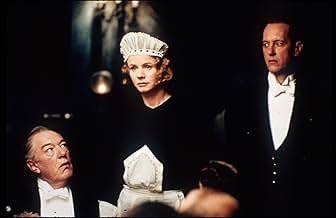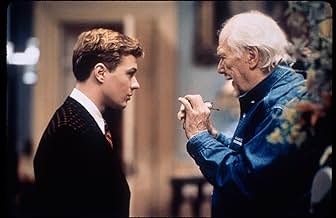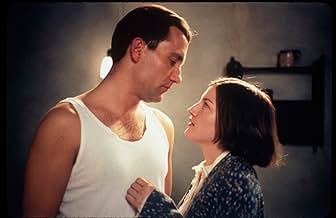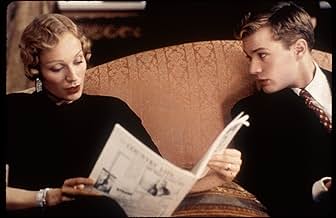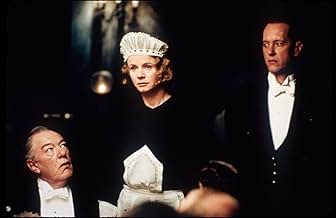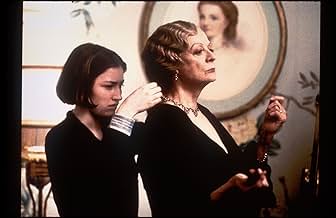La vie des invités se logeant à l'étage et des domestiques au rez-de-chaussée lors d'une fête en 1932 dans une maison de campagne en Angleterre alors qu'ils enquêtent sur le meurtre de l'un ... Tout lireLa vie des invités se logeant à l'étage et des domestiques au rez-de-chaussée lors d'une fête en 1932 dans une maison de campagne en Angleterre alors qu'ils enquêtent sur le meurtre de l'un d'entre eux.La vie des invités se logeant à l'étage et des domestiques au rez-de-chaussée lors d'une fête en 1932 dans une maison de campagne en Angleterre alors qu'ils enquêtent sur le meurtre de l'un d'entre eux.
- Director
- Writers
- Stars
- A remporté 1 oscar
- 36 victoires et 74 nominations au total
Avis en vedette
Altman's preferences for kaleidoscopic social observation has sometimes failed in the past due to the weight of its own ambition: multi-plotted and multi-charactered snapshots of time and place held together by loose ties or a general thematic framework. Sometimes it pays off spectacularly (Nashville); sometimes it flatters to deceive (Short Cuts).
It works well here due to the necessary discipline of the single location and the greater opportunities for interaction among the characters this affords. Add to that an exemplary cast of (mostly) British character actors and a knowing script by Julian Fellowes that gives Altman's keenly observant camera plenty of time to make its own points.
Rightly, Altman is less concerned with the murder mystery, which is almost an aside, than with the opportunity given by a shooting party at a 1930s stately mansion to observe the English aristocracy and their servants in social interaction.
Never happier than when involved in a bit of human anthropology, Altman lightly dissects the complexities and hierarchies which go on both above and below stairs; in which many subtle and unsubtle rituals are played out among groups of people who clearly dislike each other but are forced through circumstance, need or employment to observe the fundamental social practices required.
1932 is also a time of intruding change into the nature of the old English ruling classes, slowly disintegrating in this between-wars period and, in this case, largely reliant on the wealth of one particularly reluctant patron to keep them in furs and flunkies. In on this act comes the (to them) faintly odious whiff of 20th century new money, represented by Hollywood and popular culture. These intruders are kept in their place, but the message is clear - change is coming, and coming fast.
The muted colours and autumnal setting continue this theme of a world in terminal decline and of a group of characters keenly conscious of place and tradition yet also wearied and exhausted by it. Only at the very end, when fundamental change has occurred and many characters are left to face up to very different destinies do we see a bit of sunshine creeping in, heralding the dawn of a new era.
The cast are all excellent, with special mention deserving of Maggie Smith's effortless scene stealing as a bitchy but broke old Countess; the ever reliable Jeremy Northam as matinee idol Ivor Novello, well aware of his place in the great scheme of things and young Kelly Macdonald in the pivotal role of Smith's harassed maid who's inquisitiveness rattles a whole load of family skeletons.
The story moves on as the characters begin to establish their names and the audience learns their varying social status. The intertwining stories among the guests begin to surface and the audience begins to realize there is much more in this house than what meets the eye.
During the night one member of the elite group is killed. None of the guests seemed to be fazed by this event and are only upset by the inconvenience it sets up for their lives.
The only one troubled is Constance, Countess of Trentham's maid, Mary (Kelly McDonald). The story begins to focus on Mary, who discovers secrets among the visitors and leads the audience to solve the mystery.
The great aspect about this film is Robert Altman's abilities to bring the past to life. He pays excellent attention to detail and is able to recreate the feelings and morals during the time period. He emerges the audience into a film world filled with history and story. Throughout the film Altman visually shows the audience the contrast between social classes through his various shots, lighting techniques, and camera filters. His fluid camera movements visually portray foreshadowing and relationship among characters. These elements give the audience a complete understanding of the mood and atmosphere in the film.
I recommend this movie to anybody who has the patience to sit and focus on this excellent film. Although the beginning is appropriately slow moving and the characters names are difficult to remember, the payoff is worth the efforts. This movie is made for active film viewers and all Robert Altman fans.
The film admittedly stinks as a murder mystery---it's almost funny how little Altman himself seems interested in the who-dunnit. But, typically for Altman, it's the deconstruction of the genre that he's interested in, not the genre itself. This movie isn't about a murder in a country house; it's a movie about class differences and people connecting (or not connecting) with one another.
It seems futile to mention stand out performances in a film filled to the rafters with stand-out performances, but I did especially like Emily Watson as a cheeky maid, Helen Mirren as the "perfect servant," and Kelly MacDonald as the novice lady's attendant who grows more than anyone else over the course of the film.
The film is at its best when it's probing the emotional depths of the story---it comes across as a bit too glib when the satire gets especially acidic (mostly with the Kristin Scott Thomas character), but like the best of his movies ("Nashville," "M*A*S*H," "Short Cuts") Altman knows how to control his own cynicism and doesn't let sarcasm rule.
With his on again-off again track record, we can expect the next Altman film to tank, so let's enjoy this one while we can.
Another thing that I want to say about this film, is that after having seen Black Hawk Down a couple of days ago, this movie is as much a technically visual masterpiece as the Ridley Scott film. The use of foreground and background is simply amazing. The choreography and blocking of the movement is perfect. Is it rigid? Yup. And that's the point.
It's a shame that movies like this are refered to as boring and stiff. One reviewer suggested that it would work as a thirty minute short as opposed to a nearly two and half hour long movie. That seems like a ridiculous notion to me because then all it would have been a murder mystery as opposed to what a wonderfully filmed character drama.
And hey, I didn't remember a single name either. Maybe people who have criticized this movie for that should look back and see how many movies they remember all the names of all the characters upon the first viewing. My thought is that most of the names are inconsequential anyhow.
The acting is superb, and this is a movie that really benefited from its great actors. Too often people will praise the acting of a film just because it has famous people in it, even of their talents weren't fully utilized for the characters they portrayed. But these characters were complex and it was those subtle aspects of the acting, the brief facial expressions, tones of voice, and other details that took the film to the next level.
Interesting character studies, an enticing mystery, a bit of humor, an homage to classic detective films, and a drama that gives you a glimpse of a very specific little world, one that you're probably not accustomed to. Those are the things you can expect from Gosford Park, and I highly recommend it.
Le saviez-vous
- AnecdotesThe camera is always moving (if only slightly) in every shot as requested by producer and director Robert Altman.
- GaffesThe movie takes place in 1932 but some of the songs Ivor Novello sings for the guests didn't come out until years after, like "Glamorous Night" (1935), "Why It Wasn't You" (1937), "I Can Give You a Starlight" (1939) and "Waltz of My Heart" (1939).
- Citations
[Morris Weissman is asked about his upcoming movie project]
Lady Sylvia McCordle: Mr Weissman.
Morris Weissman: Yes?
Lady Sylvia McCordle: Tell us about the film you're going to make.
Morris Weissman: Oh, sure. It's called "Charlie Chan In London". It's a detective story.
Mabel Nesbitt: Set in London?
Morris Weissman: Well, not really. Most of it takes place at a shooting party in a country house. Sort of like this one, actually. Murder in the middle of the night, a lot of guests for the weekend, everyone's a suspect. You know, that sort of thing.
Constance: How horrid. And who turns out to have done it?
Morris Weissman: Oh, I couldn't tell you that. It would spoil it for you.
Constance: Oh, but none of us will see it.
- Générique farfeluThe cast credits at the end are separated between above stairs, visitors and below stairs, arguably listed in order of status within the British class system.
- ConnexionsFeatured in Siskel & Ebert & the Movies: The Best Films of 2001 (2001)
- Bandes originalesWaltz of My Heart
Performed by Christopher Northam
Composed by Ivor Novello & Christopher Hassall (as Christopher V. Hassall)
© Chappell/Music Limited
By Kind Permission of Warner/Chappell Music Ltd
Meilleurs choix
Détails
- Date de sortie
- Pays d’origine
- Site officiel
- Langues
- Aussi connu sous le nom de
- Gosford Park
- Lieux de tournage
- Syon House, Syon Park, Brentford, Middlesex, Angleterre, Royaume-Uni(interiors: upstairs bedrooms)
- sociétés de production
- Consultez plus de crédits d'entreprise sur IMDbPro
Box-office
- Budget
- 19 800 000 $ US (estimation)
- Brut – États-Unis et Canada
- 41 308 615 $ US
- Fin de semaine d'ouverture – États-Unis et Canada
- 241 219 $ US
- 30 déc. 2001
- Brut – à l'échelle mondiale
- 87 754 044 $ US
- Durée2 heures 17 minutes
- Mixage
- Rapport de forme
- 2.35 : 1



